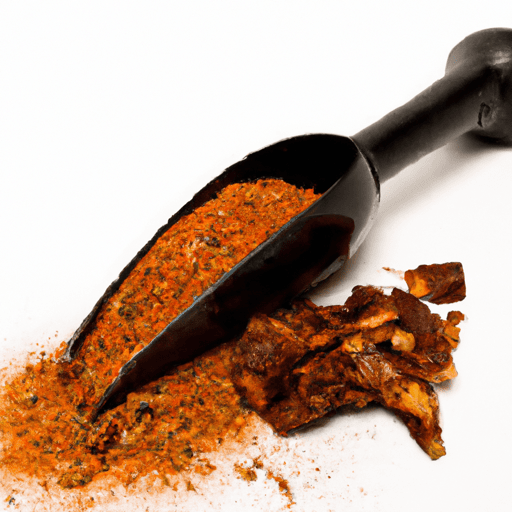The Flavorsome World of Barbecue Spice
Are you ready to add a burst of bold and smoky flavor to your culinary creations? Look no further than the magical blend of barbecue spice! A staple in American cuisine, barbecue spice is a versatile seasoning that can elevate any dish to barbecued perfection. In this blog post, we’ll explore the tantalizing taste, common uses, nutritional value, and fascinating history behind this beloved spice.
The Smoky Symphony of Flavors
Barbecue spice is characterized by its rich, smoky, and slightly sweet taste. Its complex blend of spices creates a harmony of flavors that dance on your palate. The prominent notes of smokiness instantly transport you to a summer cookout or a cozy backyard bonfire. The subtle sweetness adds a delightful balance, making it an instant crowd-pleaser.
Unleash Your Culinary Creativity
Barbecue spice is incredibly versatile and can be used in a variety of dishes. It’s most commonly associated with barbecue-style cooking, but its applications go far beyond grilling. Here are some popular uses of this delightful spice:
Grilled Meats: It’s no surprise that barbecue spice pairs perfectly with grilled meats. Whether you’re cooking up mouthwatering steaks, juicy burgers, or tender chicken, a generous sprinkle of barbecue spice will take your creations to new heights of flavor.
Roasted Vegetables: Don’t let the name fool you – barbecue spice isn’t just for meat lovers. Roasted vegetables benefit immensely from this savory seasoning. Toss some potatoes, carrots, or zucchini in a drizzle of olive oil and a dusting of barbecue spice before roasting them for a smoky and robust side dish.
Sauces and Marinades: Barbecue spice is a game-changer in sauces and marinades. Add it to your homemade barbecue sauce or use it as a dry rub to infuse your meats with irresistible flavor. The smokiness and depth of this spice will leave your taste buds begging for more.
Snacks and Nuts: Looking to add a twist to your snack game? Sprinkle some barbecue spice on popcorn, roasted nuts, or even homemade potato chips for a unique and addictive treat.
A Dash of Nutrition
Beyond its incredible taste, barbecue spice offers some nutritional benefits worth noting. While the exact composition may vary, here are a few common ingredients found in barbecue spice and their potential health perks:
Paprika: This vibrant spice is rich in antioxidants and has anti-inflammatory properties.
Garlic and Onion Powder: Both garlic and onion offer potential immune-boosting and antioxidant benefits.
Black Pepper: Black pepper may aid digestion, enhance nutrient absorption, and possess antibacterial properties.
While barbecue spice is generally consumed in small amounts, these added health benefits are a welcome bonus to your culinary adventures.
A Flavored History
Barbecue spice has deep roots in American culinary heritage. In the early days of the American South, when barbecues were community events, families developed their secret spice blends to impress their neighbors and friends. Over time, these unique blends spread across the nation, becoming an integral part of American cuisine.
Today, barbecue spice variations can be found from coast to coast, each with its own twist on the classic blend. From Texas-style with its emphasis on smoky heat to the sweeter Kansas City-style, barbecue spice has evolved and adapted to suit regional preferences.
Get Grilling with Barbecue Spice!
Barbecue spice unlocks a world of exciting flavors that enhance countless dishes. Whether you’re grilling up a storm or adding a pinch to your favorite recipes, this versatile spice blend is sure to bring a smile to your face and a burst of smoky deliciousness to your taste buds.
So, next time you fire up the grill or crave a taste of barbecue goodness, don’t forget to reach for the barbecue spice. It’s the secret ingredient that will transform your ordinary meals into extraordinary culinary delights!
Barbecue Spice
Origin: Barbecue spice, also known as BBQ spice or barbecue seasoning, originated in the United States. It is inspired by various regional barbecue traditions, such as those found in Kansas City, Memphis, Texas, and the Carolinas.
Common Uses: Barbecue spice is a versatile blend of spices that is commonly used to enhance the flavor of grilled or smoked meats. It is often used as a dry rub, marinade, or seasoning for pork ribs, beef brisket, chicken, and other meats. It can also be sprinkled on vegetables, corn on the cob, and even popcorn to give them a smoky and savory taste.
Nutritional Benefits: The nutritional benefits of barbecue spice depend on the specific ingredients used in the blend. However, many barbecue spice blends contain spices like paprika, chili powder, garlic powder, onion powder, and black pepper, which are rich in antioxidants and may have anti-inflammatory properties. Additionally, these spices can add flavor to meats and vegetables without the need for excessive salt or sugar.
Unique Properties and Historical Significance: Barbecue spice blends can vary widely in their specific ingredients and ratios, leading to unique flavor profiles. Some blends may have a smoky and sweet flavor, while others can be spicy or tangy. In the United States, barbecue has a strong cultural significance, with each region having its own preferred style of barbecue and accompanying spice blends. These spice blends have evolved over time and have become an integral part of barbecue culture and tradition.
Remember to adjust the usage of barbecue spice based on personal preferences and dietary restrictions.




Use the share button below if you liked it.
It makes me smile, when I see it.